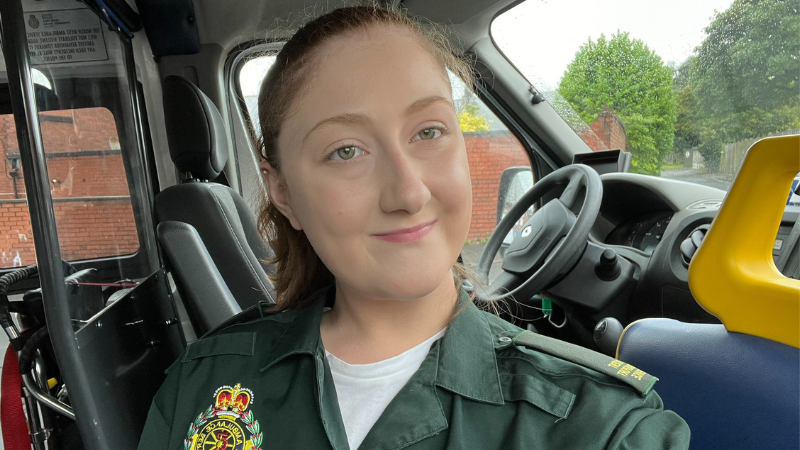
“Hello, my name is Kaitlyn, and I am 20 years old and have just started as a bank staff member, which means I work on an ad hoc basis. It is perfect for me as I am about to embark on the MSci Nurse Paramedic degree at Edge Hill University.
“I have always had a passion for the ambulance service, but I didn’t realise there are roles you can apply for in which you don’t need to be degree-educated.”
“Before I had started the role, I had been a student adult nurse for a little over a year and had decided that adult nursing alone wasn’t for me, and that’s ok! Not all paths into your career are linear. I wanted to work with all ages and in more emergency/urgent care and fell in love with the paramedic role in an observational placement with NWAS while on my nursing.”
Why patient transport service?
In my previous roles before joining the ambulance service, I worked in various healthcare settings, from community to hospital. During this time, I saw how important the patient transport service is for patients across primary, secondary and tertiary care. I formed good relationships with the PTS staff, who regularly picked up patients from their homes/appointments and always greeted me with a smile and a bubbly/friendly attitude to their work. After a while, I decided to speak to one of them on my break about the role and what it entails, and it sounded amazing and something I would enjoy. I then took my first steps by completing the application process via NWAS’ current vacancies and was successful.
What did you do on the first day of training?
We were a group of 12 from a variety of different backgrounds and a variety of different ages. I was the youngest trainee and was welcomed by everybody. We were given a timetable of what to expect over the next three weeks and did some ice breakers to get to know one another; we then had our training package thoroughly explained.
Our training started with corporate inductions and IT – including setting our work iPads up and getting all our passwords and accounts sorted for the systems we use in our jobs.
Our first session was on the basic anatomy and physiology of the human body. We learned about different conditions that may affect our patients, our scope of practice in various clinical situations, and how to escalate situations where our patients may deteriorate during their journey with us. I came home after my first day feeling like I had made a positive career change.
As the training progressed to week three, we started the driver training when we went out with our instructors in the ambulances to learn the gold standard way of driving. I didn’t know how many bad habits I had picked up, but they have now been rectified! We built our confidence on various roads, including urban, country, A roads and motorways and worked on various maneuvers. It was a learning environment where making mistakes was part of learning, and we were all very supportive of one another during this time.
What are your first impressions?
During the three weeks of training, I had a moment where I felt pretty emotional (in a good way!) After a drive to Kendal, I had a moment with myself where I realised this is where I belong, and I had never felt more optimistic about a job role in my life. The people I worked with contributed to this as they made me feel so involved and like my green family just after three weeks!
I was worried about the driving week as I had no previous driving experience with larger vehicles. Still, my peers and instructor were always so positive about my capabilities, and when I doubted myself, they lifted me and allowed me to continue; I’m so thankful for that.
What will you be doing day to day?
We start our day by doing all our vehicle checks to ensure the vehicle is safe and clean for our patients. Day to day in PTS is different; we take patients to their non-emergency hospital appointments and home and make a strong rapport with them.
We help patients of all ages, from different backgrounds, and with various conditions. Sometimes we are the first point of contact our patients have had all week, so we always take time to make a difference in their day. Whether chatting or making them a cup of tea, it can mean the world to them.
We can be anywhere in the North West and conduct many daily journeys. We are in constant contact with the control who support and guide us through our shift.
We can have busy and quieter periods but at the heart of everything we do is communication, as this is the core skill our role is based upon. We safeguard patients when necessary and can also provide basic life support and first aid if needed.
Have you made any workmates yet?
Yes! Since being part of north west ambulance service, I have felt so welcomed by the staff at my base and those I meet on the road and have made friendships with them, which developed quite fast regardless of age. I am particularly close to those with whom I did my training course, and we have a group chat to support one another as we transition into our new roles. We are currently in the process of organising a night out when we are all free!
I have also made good work relationships with my managers and feel supported.